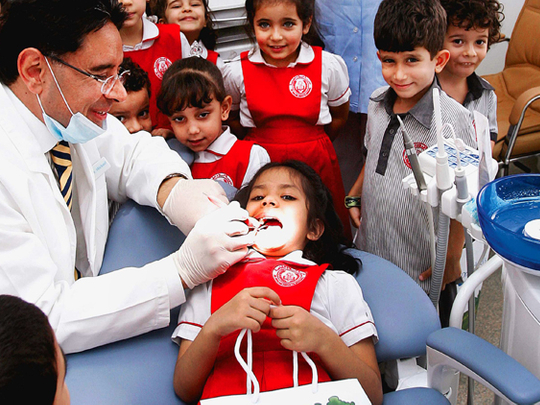
Dubai: Educate both the mother and child to stop the high incidence of tooth decay in the UAE and provide easy access to dental care, dentists said yesterday.
As World Oral Health Day is marked on March 20, dentists warn that frequent snacking among children (two or three times a day) and poor oral hygiene has shot up the incidence of tooth decay to 76 per cent among schoolchildren.
“This is the most common chronic infectious disease among children, five times as common as asthma,” said Dr Manal Al Halabi, paediatric dentist and programme director at Dubai School of Dental Medicine.
Speaking to the media on the eve of Oral Health Day, the dentist said teeth decay (caries) is now a global pandemic and is increasing in developed and developing countries.
The theme of World Oral Health Day is ‘Celebrating Healthy Smiles’ and reflects the major contribution oral health makes to our lives.
Compared to the UAE, the incidence of dental caries is 28 per cent in the US, said Dr Manal. The Dubai Health Authority (DHA) had tested 5.000 schoolchildren in Ajman and found a huge number of children suffering from tooth decay.
It was found that children of less educated mothers suffer from this disease, Dr Manal said, and urged urgent steps to make mothers and children aware of the dangers of the disease through oral health programmes.
She said it was sad that even three-year-olds come to the clinic for treatment and have their bad teeth removed.
Dr Crawford Bain, professor of peridontics at the Dubai School of Dental Medicine, said gum disease is common among smokers and teenagers are more motivated not to smoke if discoloured teeth are shown on packages as warning. “It is more effective than warning about lung cancer,” he said.
He quoted a Saudi study that showed that cigarette and sheesha smoking increased the severity of gum diseases.
“Gum disease does not hurt,” he said. By the time it reaches an advanced stage it is late, he said.
Dr Shahnaz Faraz, specialist paediatric dentist, said special needs children are more at risk of oral disease.
She said it was unfortunate that health insurance does not cover preventive care. “The cost of treatment shoots up due to lack of preventive care,” she said.












